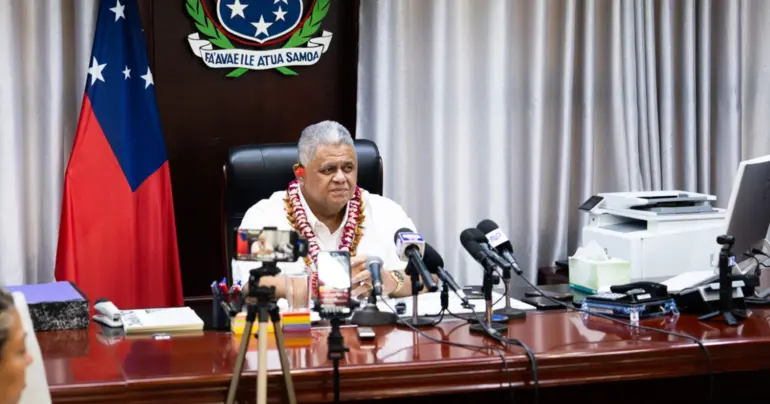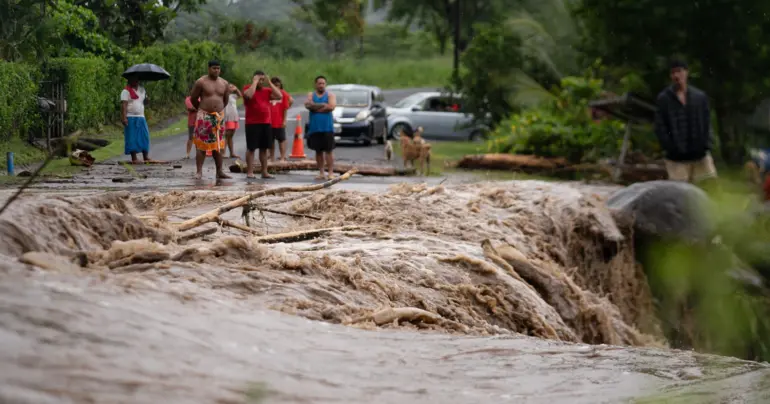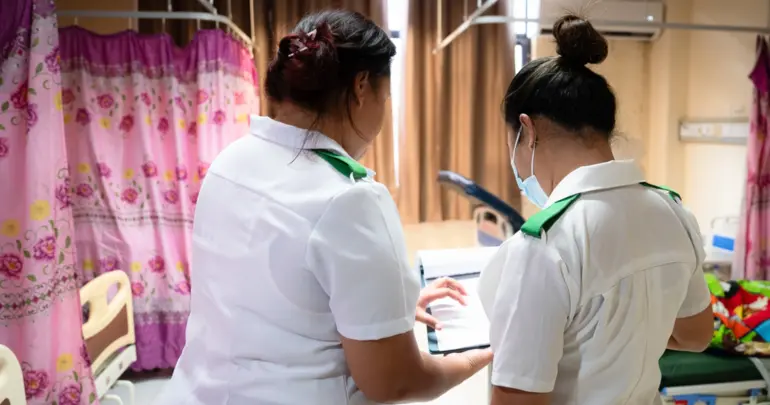After delay, new cancer tests could save women
 By Sapeer Mayron
•
14 January 2021, 12:20PM
By Sapeer Mayron
•
14 January 2021, 12:20PM
After a year without testing, a private screening programme starting this month may be Samoan women’s only chance to access timely results of tests designed to help prevent cervical cancer.
The Ministry of Health had to stop sending cervical smear test slides to Australia when national borders were closed in March 2020.
It has been unable to read any tests locally with expert pathologists no longer in the hospital.
In response, the Ministry put a hold on private practice doctors conducting tests, in favour of them only being conducted at the national hospital.
It is not known how many such tests were sent overseas, but the Samoa Observer understands many patients are still waiting for results of tests taken throughout last year.
A women’s health specialist, Dr. Salote Vaai, told the Samoa Observer that the lack of testing during 2020 will mean more women will present with H.P.V. or cervical cancer than should have.
“We are going to have a lot of work to catch up on once we restart next year,” she said.
But this month, the Health Specialist Centre in Moto’otua, run by Obstetrics and Gynaecology specialist Professor Alec Ekeroma, will launch a pilot programme to screen 1000 women for human papillomavirus (H.P.V.) which causes cervical cancer.
The centre in 2019 acquired the equipment enabling them to process the tests without a pathologist on site in under 45 minutes. A nurse is already undergoing training to use the machine.
Professor Ekeroma, who is also the Vice Chancellor of the National University of Samoa, said women can self-administer the test before nurses can process test “four at a time” using technology brought in to prepare for COVID-19.
He spoke critically of the way testing for H.P.V. had been conducted since the state of emergency had been declared in March.
Samoa has long had a problem with testing for H.P.V. and cervical cancer as there is often no pathologist at the hospital.
There was a time when pathologist Dr. Filipina Amosa-Lei Sam was engaged at the hospital but in early 2020 she became the head of the National University of Samoa School of Medicine.
Professor Ekeroma said in her absence a pathologist employed via Australian Aid was able to read some tests but when the borders closed she had to leave for New Zealand, where she is still able to read some tests but only with a significant delay.
That delay can put some women off getting a test done, the Professor said.
“Basically there was never really a comprehensive programme, it was opportunistic and only well earning and well-read women were having smears done. That is the reason why we still see deaths from cervical cancer,” he said.
“Any smears done since [Dr. Amosa-Lei Sam] left basically were kind of unethical, people knowing the smears were not going to be read and yet they still took the smears. They are banking up at the laboratory.”
But Professor Ekeroma says new technology can be used to change the way tests are conducted in Samoa - hopefully more broadly than just through the current pilot programme.
Having acquired a “GeneXpert” testing machine and other necessary equipment last year, the Centre is able to process the tests without a pathologist in just 45 minutes.
Another virtue of the programme is that women can even self-administer the test, which enables women found to be at high risk of cancer to receive treatment.
“A woman goes to the bathroom with a swab, she swabs herself and puts the swab inside a container with the [ThinPrep] liquid in it,” explained.
“She brings it out with her name on it and we will put it in the lab. The nurse will go across, put drops into a cartridge, the cartridge is put into the GeneXpert machine. We can do four at a time. You press a button and away it goes, 45 minutes later the result is known.”
(Self-administered swab tests instead of those performed by a doctor with a speculum, are proven to increase the rates at which women undergo testing).
Professor Ekeroma hopes it may be easier in future to establish a national screening programme.
And now that the National Hospital has several GeneXpert machines, he sees new potential for national screening.
"The hospital is now inundated with GeneXpert [testing] machines because of the COVID-19 so they have more than two, they could dedicate machines to do H.P.V. testing," he said.
The Ministry of Health Director-General Leausa Dr. Take Naseri did not respond to emailed requests for comment. Approached on Wednesday at a press conference he declined to speak and said he would refer this newspaper to someone at the hospital, which he did not do.

H.P.V. is a sexually transmitted infection that plays a role in causing most cervical cancers.
There is a successful vaccine for H.P.V, and in 2019 the Asian Development Bank and United Nations Children’s Fund committed funds and resources towards getting vaccines to Samoa.
The COVID-19 pandemic has delayed the process, and the Ministry of Health did not respond to a request for information about when the programme might begin.
As part of the new cervical screening programme, Professor Ekeroma’s clinic has established the Health Specialist Charity (H.S.C.) to encourage donations to the service.
Because of the cost of the consumables, each test will still cost a woman $150, which will likely limit the type of person who can afford to take the test.
The cervical screening programme will also be linked to Dr. Amosa-Lei Sam’s research project. In order to get the best representative sample for the research, ideally, the 1000 women will represent the community, Professor Ekeroma said.
“Everyone is worried about the integrity of the sample because if the sample is skewed then you can’t generalise the result. There is always that fear we are not representing the community.
“But that is the reason we are having a launch, we are inviting key people, some bankers and diplomats so we can see if we can get some money. Now that we are a charity they shouldn’t be shy donating a few bobs to fund smears for poor women.”
Prime Minister Tuilaepa Dr. Sailele Malielegaoi is slated to give the keynote address at the launch, and Associate Minister Salausa Dr. John Ah Ching (also a gynaecologist and obstetrician) is a charity trustee.
The charity and cervical screening project will be launched on Saturday 23 January and tests will be available at the clinic the following week.

Dr. Vaai started last year with a waiting list of about 20 patients.
“[It] has grown to more than 100. I am telling all of them to go to the hospital but I don’t know how many are going to the hospital,” she said.
She runs her own practice, called Health in Her Hands. She said general practitioners in private practice need to be able to offer preventative screenings like cervical smears because the hospital is not always accessible enough.
The National Hospital gynaecological department runs two clinics a week that are typically two or three hours long each. They see 10 patients a day for 40 minutes each, leaving many more women unable to see a gynaecologist for weeks at a time, she said.
“If you tell a woman this clinic is open six days a week, they will go any day of the week. But if you tell a woman you can only go on Tuesdays and Wednesdays there will be a number of women that it doesn’t suit them.”
And while it can be expensive to conduct tests at the clinic instead of offering it to women for much cheaper at the hospital, Dr. Vaai worries that women who are referred to another clinic or site will simply not go to that appointment.
She said she intends to phone all her patients and follow up whether they did in fact go to the hospital for a smear, and whether they ever got results if they did.
“I do have a lot of patients too that I have been saying go to the hospital but they don’t, they won’t, they would rather wait until the G.P.s get screenings.”

Professor Ekeroma said when his clinic used to conduct cervical screenings in 2019 it could cost the patient between $250 and $300 to have her test because of the cost of sending the test to a pathology laboratory in New Zealand.
He and the research team behind the screening programme expect between two and five women to present with H.P.V. or signs of cancer out of 1000 they are able to test.
“If she has a high-grade abnormality she will need treatment which means removing the area where there is an abnormality,” he explained.
“If it’s a low-grade lesion the woman is asked to go home and come back in a years’ time when we check it has not progressed.
“If it’s definite, overt cancer you can see then really that woman either needs a radical hysterectomy or surgery plus radiation and with travel restricted to India, it will be difficult. But at least we will be preventing some women from getting cancer of the cervix going forward.”
A November 2020 study on the 10 years of cancer incidence in Samoa (which Dr. Amosa Lei-Sam co-authored) found 62 per cent of all cancer cases in the country are in women. Among them, cancers of female genitalia (including the cervix) account for 36 per cent of cases.
“Cervical cancer rates have increased dramatically compared with the past eight years,” the study noted, “although these rates are lower compared with the most Pacific nations such as Fiji, Vanuatu, and Papua New Guinea.”
The team chose to offer self-swabbing instead of speculum tests because of their proven record in getting more women to get the tests done.
In 2018 Dr. Malama Tafunai published her research into how acceptable H.P.V. self-sampling tests would be to Samoan women and health workers and found women she interviewed thought the self-sampling tests would be good.
She said Samoa is in a good position to develop a cervical cancer prevention programme using self-swabbing, especially if there is political commitment to such a programme.
According to her research, rates of cervical cancer and mortality are increasing in the Pacific, although this could be due to improved screening and reporting.
“Anecdotally, women’s health workers in Samoa believe cervical cancer to be prevalent and that they were seeing more women presenting at younger ages with advanced disease in recent years,” Dr. Tafunai wrote.
A study done in Te Tai Tokerau Northland, New Zealand, conducted similar research and found positive results for Maori women, who are two and half times more likely to die from cervical cancer than others.
It found 60 per cent of Maori women took the self-test when offered, which was three times more women than those offered a speculum administered smear.
Today in Samoa, three elderly women are currently receiving palliative care for stage four cervical cancer from the Samoa Cancer Society.
They presented at such a late stage in their cancer that they were denied the opportunity to seek treatment overseas, S.C.S. outreach nurse Fuamatala Tofilua said.
Chief Executive Officer Su’a John Ryan said preventative care is the best way to handle cancer because once the disease develops it gets harder to treat.
“The idea is to catch them at stage zero, when it is still in its infancy, so to speak, and before it develops into full-blown cancer. That is when you see the best outcomes.
“In an ideal world we would have everyone coming in and getting tested at an early stage and we could screen and have preventative measures.”
S.C.S. is hoping 2021 will be the year a national cancer registry gets off the ground. Without one, it is hard to have a clear picture of the incidence, severity and mortality rates of different cancers in Samoa.
Su’a said the Ministry of Health does not share testing data with the society, so it is not known how many people currently seek routine tests for cancer like cervical smears, mammograms, prostate exams or the like.
But he said he had heard anecdotally about the delay and backlog in cervical smear testing, and it worries him a great deal.
“There is a duty of care for us in the medical profession to provide the best care possible which includes preventative care. If testing was put on hold and it had an adverse effect on not only cervical cancer but all cancers, it is of great concern to the Samoa Cancer Society.
“If there was a delay in receiving test results it’s a big concern for us because it will have a severe effect on anyone that could have had an early diagnosis. In an ideal world we could have smears read locally.”
Tags
 By Sapeer Mayron
•
14 January 2021, 12:20PM
By Sapeer Mayron
•
14 January 2021, 12:20PM











